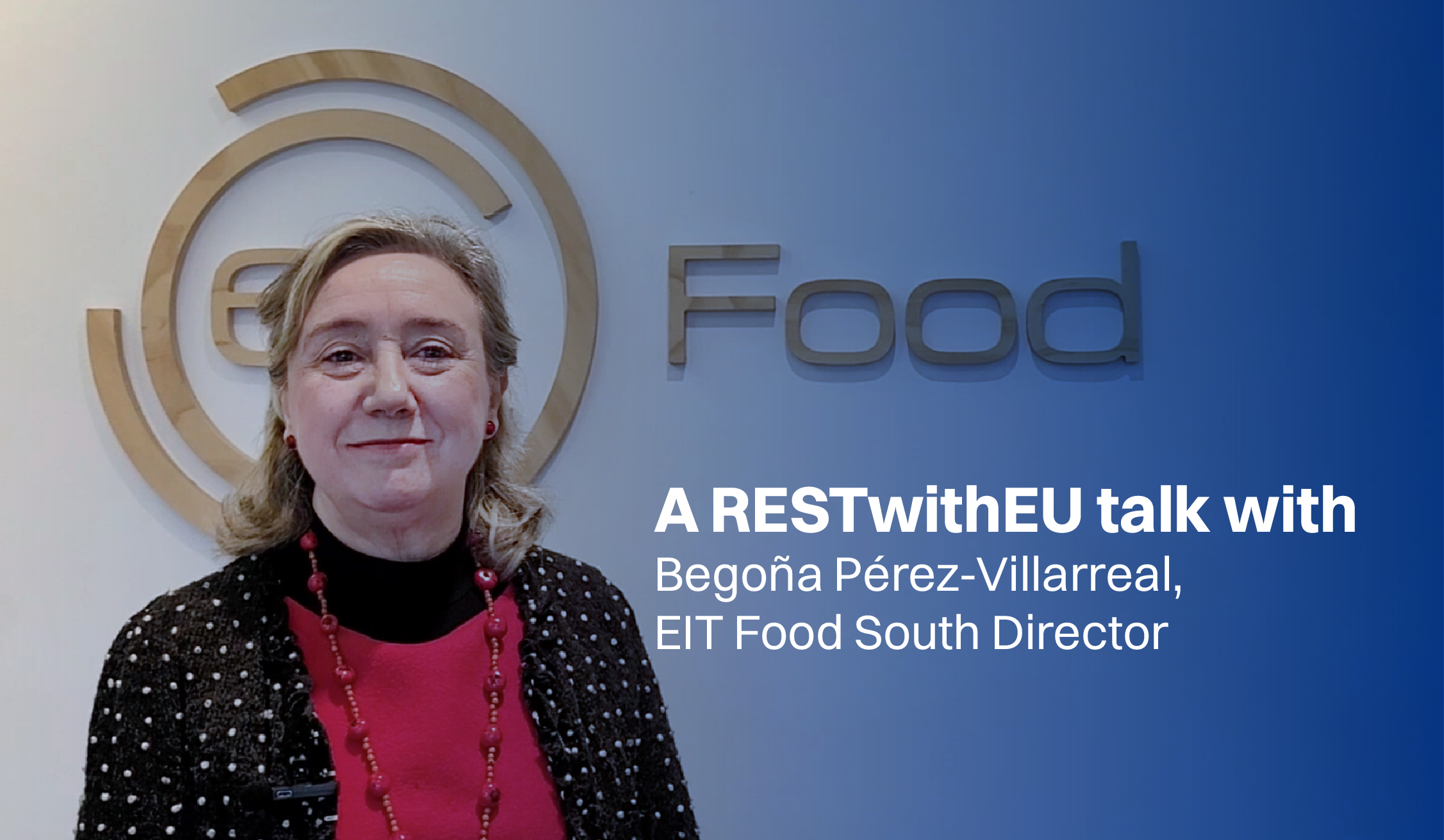“Acting as a community is the main ingredient for an effective change in the industry” – A RESTwithEU talk with Begoña Pérez-Villarreal, EIT Food South Director

Creating a more equitable food sector by building a future-proof food system that produces healthy and sustainable food for all through accelerated innovation is one of the industry’s challenges. Today we talk to Begoña Pérez-Villarreal, EIT Food South Director, about the keys to transforming the food ecosystem.
Meet Begoña Pérez-Villarreal
As EIT Food South Director, she enjoys driving innovation, boosting the entrepreneurial spirit and engaging stakeholders from the Mediterranean area to develop products and services that contribute to a healthy lifestyle and a sustainable circular bioeconomy. Trained as a Pharmacist specialized in food microbiology and in Business Management of Food companies, she has worked for 25 years with food SMEs in innovation related to food safety, product development, traceability, authenticity, and sustainability of food systems.
Begoña, is it possible to create a healthy and sustainable food system for all? How can we approach it?
Begoña Pérez-Villarreal: This is what we do in EIT Food. Our main objective is to create a healthy and sustainable and trustable food system for all Europeans. How can we do it? Working, as we do in EIT Food, as a community. We cannot loose when we are talking about food systems. We need to work in the primary sector, together with the processing, together with logistics and, of course, the restaurant sector and commercialization are key as well for reaching the consumers.
Alternative proteins such plant-based proteins, cultivated meat, and insect protein, are they a trend or is it the present and future of the food system?
Begoña Pérez-Villarreal: Yes, they are clearly a trend. Together with agri-tech trend that means all the innovation related to the primary sector is nowadays on the focus because, as we said, we cannot really think of a food system without taking into consideration very much the primary sector. So, trends related to a quality of soil, carbon measurements or alternative from fertilizers are really a very important trends in our food system. Of course, Plant-based is something we have all read about, and we can see companies coming. They are for me the two main points on the food system nowadays.
How can restaurants across Europe break the gap between countries with low innovation capacity and those leading the way in terms of sustainability and resilience? Where do they start?
Begoña Pérez-Villarreal: We know quite a lot about that in EIT Food. Every activity that we do has interegionality in Europe, which means that we always have participants from, at least, three countries. Very frequently combination of a low medium innovators and high innovators countries and actors.
The other thing is that we are always asking to be actors of that we call the knowledge triangle. That means that we have not only academias, universities, research and technological organizations, but as well industry, and we want as well to include start-ups and scale ups as much as possible. All our activities have all these actors together which means that the innovation is on balance at the end.
What could be the role of EIT Food in helping to reduce the digital GAP in the industry?
Begoña Pérez-Villarreal: Well, we have a very ambitious training and education program on deep tech technologies because digitalization is needed in different parts of the food system. We already have some online training courses and we will have much more in the next three years.
What does participation in RESTwithEU mean for EIT Food?
Begoña Pérez-Villarreal: We are complement part of it. Consumers in restaurants wants to have quite a lot of information, every day more. About the origin of the food, how has it been produce, so on. Digitalisation is key for having this information available and when we are going to a restaurant as a consumer, we are expecting not only to have a good deal, but a good experience, as well; and I think restaurants can help in the transmition of key information for consumers and the importance of the food sector.
What are the ingredients for an effective change in the industry?
Begoña Pérez-Villarreal: First, acting as a community. We have already said that food system means all the important actors together for having a successfully impact. This is for me the first and best ingredient, but it’s not the only one. Next, I would say having open innovation in our agendas, especially the food companies, being open to have new points of views, learning how to work with a start-up, scale ups to make innovation as integrated today into the day to day. As a third one, I would say continuous training. Technologies and innovations as we have seen and trends are coming really strong into our sector, so a continuous training is needed in all the key players. As the last point, I would say co-creating with the consumers. We cannot forget that consumers are key to accept all the innovation and the technologies coming to the sector. So co-creating with them from the beginning is another of the key ingredients.